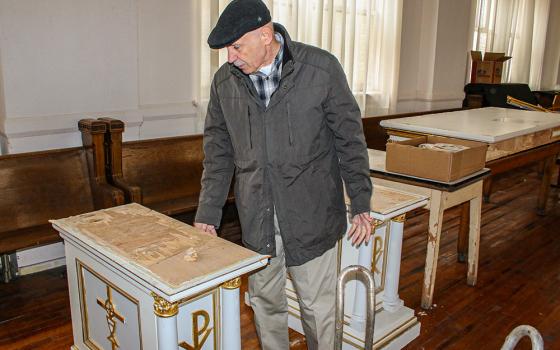
In a commentary for NCR, Jesuit Fr. Thomas Acker says that since the first publication of the Rite of Christian Initiation of Adults manual was almost 50 years ago and with a decline in church membership, it is important to consider alternate ways that can lead to conversion. Following are NCR reader responses to that commentary. The letters have been edited for length and clarity.
In the article, the author writes, "I propose that bishops, priests and others be encouraged to explore evangelization beyond the boundaries of the current RCIA book. Take a risk; the Spirit will guide people of goodwill. Do not guard the sacraments but promote them guided by the Spirit. Improve the current program and also explore other routes."
He is appealing to the clergy, of which he is one, to use the OCIA if it works and throw it out if it doesn't. This is not an unreasonable recommendation though, it is one that is unlikely to be considered, let alone followed.

The clergy spend years in "formation" and the rest of their lives in a structured, legalistic organization wherein individualism is not encouraged. The clergy will follow the bishop lockstep because if he's found not to be negative consequences will be the result. For the most part, bishops are all about numbers most importantly those of the collections. It determines where the diocese will put its resources and get the most attention. Underperformers will suffer the negative consequences including being consolidated or shuttered. For these clergy and prelates, canon law trumps all else including the Holy Spirit.
The author's proposition to "explore evangelization beyond the boundaries of the current RCIA book" falls on deaf ears. To most, its anathema to propose this is the context of the ministry of Pope Francis. A scientist has metrics for success because of education, training, work ethic and natural inclination. The cleric by inclination, education, training, work ethic and natural inclination avoids accountability by playing the faith card.
MICHAEL J. McDERMOTT
Tyler, Texas
***
With all due respect for Jesuit Fr. Thomas Acker's educational background and successful administrative practices, I disagree with his assessment.
First, each person entering the conversion process is most often treated as an individual, and second, not all of Acker's statements are accurate. OCIA is not an academic program somewhat lined up with a school year, nor is it a series of rules to be followed, which seems to be his perception.
Acker used the story of the immediate baptism of the eunuch as an example of allowing the Spirit to work, concluding with "they never met again." If the instructions, rites and community involvement of a well-orchestrated OCIA are followed, the newly baptized will be seen again on a weekly basis, and very much a participant in parish life.
SALLY MEYERS
Rancho Cucamonga, California
***
I read Jesuit Fr. Thomas Acker's article with interest, for two reasons.
The RCIA/OCIA is an excellent program, used in the right context. However, changing the title from Rite to Order does not change the context in which this program is many times operated. The whole program is still given as Christian initiation, when in most cases the people it is aimed at are already Christian. Therefore, for all its strengths, the ecclesiology being employed is still incorrect, the understanding we Catholics have of other Christian traditions still greatly mistaken. Yet we continue our work under that mistaken understanding — and do damage to the body of Christ as a result.
The other reason is that, while we continue to pour enormous resources in money and time into OCIA, we do very little to welcome to our community that massive cohort of people who are already here, the spouses and couples within our midst, part of our community, who live in interchurch marriages.
Research in Australia indicates that as much as one-third of married couples where a Catholic is one of the spouses involves a Christian of another tradition. In Canada, similar research indicates slightly more Catholics marry Christians of other traditions than marry fellow Catholics. Perhaps if we recognized and invested 1/4 as much in their marriages, their presence, recognizing and celebrating the gift of unity they live in our midst, we would have more participation by such couples, and a stronger church.
RAY TEMMERMAN
Winnipeg, Manitoba
Advertisement
***
I was most disturbed to read the article by Jesuit Fr. Thomas Acker. Despite his sparkling academic credentials and experience, it is painfully obvious that Acker does not have any extensive, intimate experience with the initiation process of the church that was revived with the Second Vatican Council.
His language has nothing to do with the process envisioned by the council and elaborated in the current Rite of Christian Initiation of Adults. I am guessing that Acker is in possession of one of the many school year-modeled manuals that appeared as guides to the process. The order has nothing to do with school or the appropriation of information, but is a process directed by the Holy Spirit, who calls seekers in many diverse ways, facilitated by parish ministers and the whole people of God.
The liturgical rites not only highlight milestones in the conversion journey, but are transformative in themselves. It is as unique to each person as his or her life experience and conforms itself to their growth in a relationship with Christ through the Spirit. It is open-ended and often takes several years. It is not instruction in the faith; it is an immersion in the life of the church that guides the seeker on their path to Christ and helps discern their call by the Spirit.
CARMEL ANN SPERTI
Oneonta, New York
***
This comes in response to the opinion written by Jesuit Fr. Thomas Acker which lambasted the Order of Christian Initiation of Adults.
Acker raises the question "Is OCIA the only way?" The answer is, "Yes, it is." The Order of Christian Initiation of Adults is a rite of the church. Its use was made mandatory in the dioceses of the United States in 1988. He does not get to "adapt" it any more than he could the texts of the Mass or the Order of Penance.
The author's vocabulary throughout the article exposes his own ignorance of the rite. He calls it an "RCIA manual" and a "program [of] six to eight months long with weekly meetings." He mocks it as a "contest of endurance" and instead takes great pride in his own inadequate "directed reading course" where he met with the inquirers four times in three months. That's not a process of conversion, that's a tutorial! That's not a community of the faithful accompanying the inquirer (RCIA 4), that's a private class. It shows no respect for an individual's baptismal status nor one's personal faith journey.
I have journeyed with inquirers, catechumens, and candidates for over 35 years and I appreciate how the RCIA process formed each of them.
I am disappointed that NCR gave this article such a microphone.
RITA A. THIRON
Executive director, Federation of Diocesan Liturgical Commissions
Washington, D.C.
Join the Conversation
We cannot publish everything. We will do our best to represent the full range of letters received. Here are the rules:
- Letters to the editor should be submitted to letters@ncronline.org.
- Letters to the editor should be limited to 250 words.
- Letters must include your name, street address, city, state and zip code. We will publish your name and city, state, but not your full address.
- If the letter refers to a specific article published at ncronline.org, please send in the headline or the link of the article.
- Please include a daytime telephone number where we can reach you. We will not publish your phone number. It may be used for verification.
We can't guarantee publication of all letters, but you can be assured that your submission will receive careful consideration.
Published letters may be edited for length and style.
Letters containing misinformation or misleading content without correct sourcing will not be published.
Letters to the editor are published online each Friday.



